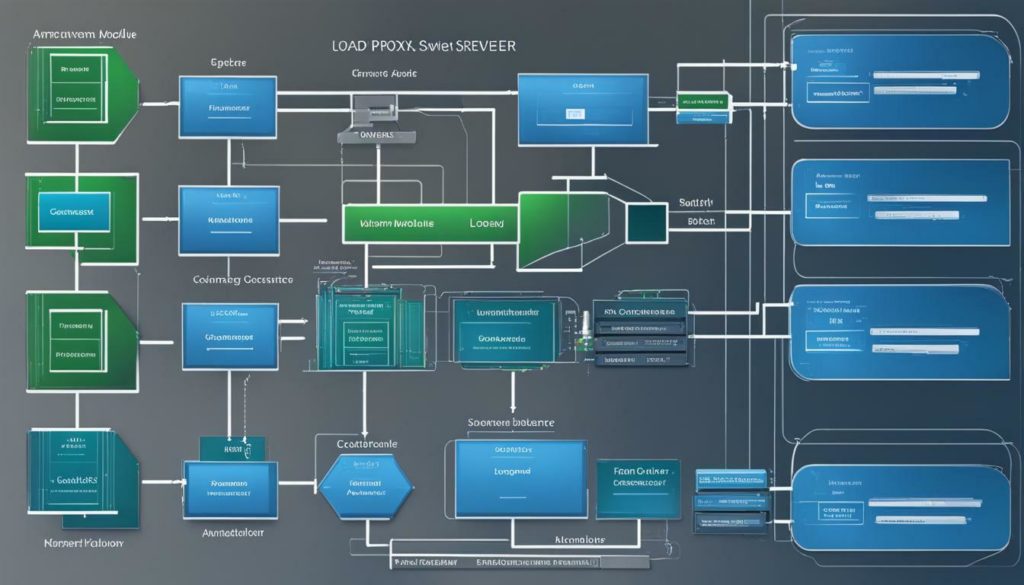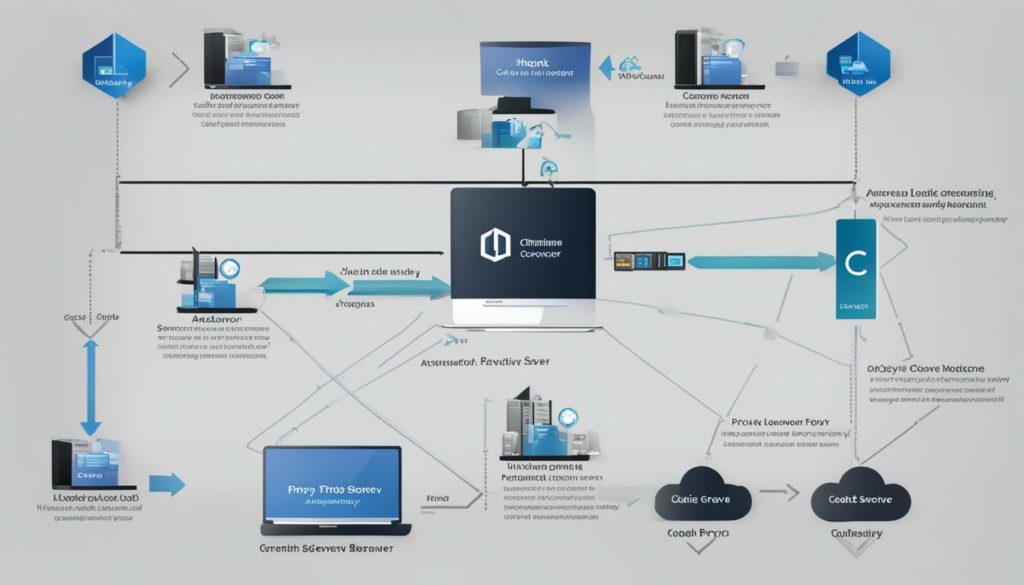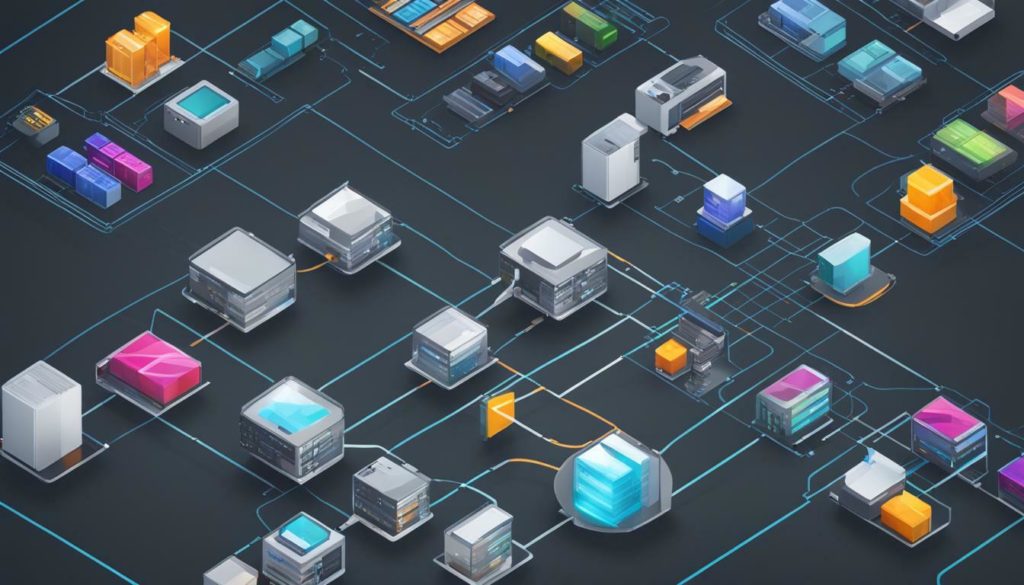Proxy servers play a crucial role in managing internet traffic and ensuring security, and understanding their architecture is essential for optimizing their functionality. A proxy server acts as an intermediary between a client and the internet, providing several functionalities such as firewall protection, network data filtering, network connection sharing, and data caching.
There are different types of proxy servers, including forward proxies, open proxies, and reverse proxies. Each type serves specific purposes and offers unique benefits. Forward proxies are commonly used to provide network anonymity, while open proxies allow users to access the internet through a different IP address. Reverse proxies, on the other hand, are used to protect web servers by handling requests on behalf of clients.
The architecture of a proxy server consists of various modules that work together to ensure its smooth operation. These modules include the user interface, server listener, connection manager, cache manager, log manager, and configuration. Each module plays a crucial role in handling user requests, managing connections, caching frequently accessed data, and ensuring security.
Proxy servers offer numerous benefits, making them an essential component in today’s digital landscape. They enhance security by acting as a buffer between clients and the internet, filtering out malicious traffic and preventing unauthorized access to websites. Proxy servers also provide private browsing capabilities, allowing users to access online services anonymously. Additionally, they enable users to access location-specific content by connecting to servers in different regions.
- Proxy servers act as intermediaries between clients and the internet, providing functionalities such as firewall protection and data caching.
- There are different types of proxy servers, including forward proxies, open proxies, and reverse proxies, each serving specific purposes.
- The architecture of a proxy server consists of modules such as the user interface, server listener, connection manager, cache manager, log manager, and configuration.
- Proxy servers enhance security, enable private browsing, provide access to location-specific content, and prevent unauthorized access to websites.
- Understanding the architecture of proxy servers is crucial for optimizing their functionality and reaping their benefits.
What is a proxy server?
A proxy server acts as an intermediary between a client and the internet, providing various functionalities such as data filtering, network connection sharing, and performance optimization. It serves as a gateway that allows clients to retrieve information from web servers while also offering additional benefits. By redirecting requests through the proxy server, users can enhance their online experience and ensure security.
Proxy servers offer several advantages, including:
- Enhanced security: Proxy servers act as a buffer between the client and the internet, protecting the client’s identity and providing an additional layer of security. They can filter incoming and outgoing traffic, preventing malicious content from reaching the client’s device.
- Private browsing: When accessing the internet through a proxy server, the client’s IP address is masked, making their browsing activities more private and anonymous.
- Access to location-specific content: Proxy servers can be configured to route requests through specific locations, allowing users to bypass geo-restrictions and access region-locked content.
- Prevention of unauthorized access to websites: Proxy servers can restrict access to certain websites, preventing users from visiting unauthorized or inappropriate sites.
Proxy servers act as a gateway between the client and the internet, offering functionalities such as security, privacy, and access to location-specific content. They play a crucial role in data filtering, network connection sharing, and performance optimization.
Proxy server types
There are various types of proxy servers that cater to different needs:
| Type | Description |
|---|---|
| Forward proxies | Act on behalf of clients to access resources from servers. |
| Transparent proxies | Forward requests without modifying them, making the client’s IP address visible to the destination server. |
| Anonymous proxies | Hide the client’s IP address from the destination server, but still reveal that a proxy is being used. |
| High anonymity proxies | Hide the client’s IP address and the fact that a proxy is being used, providing the highest level of anonymity. |
Proxy servers can be hardware or software-based, each with its own advantages and disadvantages. The choice between the two depends on factors such as scalability, maintenance, and specific requirements. Regardless of the type or form, proxy servers play a vital role in enhancing security, optimizing network performance, and controlling website access.

Please note that HTML formatting may not be retained in the text above.
Proxy servers come in different forms, each catering to specific needs and use cases. Understanding the different types of proxy servers is crucial in order to choose the right one for your requirements. Here are some of the most common types:
1. Forward Proxies
Forward proxies act as intermediaries between clients and the internet, forwarding client requests to the target server. They are commonly used to enhance privacy and bypass censorship, as they mask the client’s IP address.
2. Open Proxies
Open proxies are publicly accessible and can be used by anyone. These proxies are often used to bypass content restrictions and access blocked websites. However, they can also be less secure and may expose users to potential risks.
3. Reverse Proxies
Reverse proxies are positioned between the internet and web servers, acting as a front-end server for websites. They help improve performance by caching static content and load balancing incoming requests across multiple servers, ensuring efficient distribution of traffic.
Other types of proxy servers include transparent proxies, anonymous proxies, high anonymity proxies, distorting proxies, data center proxies, residential proxies, public proxies, and shared proxies. Each type has its own unique characteristics and benefits, catering to different use cases and needs.

By choosing the right type of proxy server, you can enhance security, control website access, save bandwidth, and improve performance. Whether you need to protect sensitive data, bypass content restrictions, or optimize network performance, proxy servers offer a versatile solution.
| Proxy Server Type | Use Case |
|---|---|
| Forward Proxies | Enhancing privacy, bypassing censorship |
| Open Proxies | Accessing blocked websites, content bypass |
| Reverse Proxies | Improving website performance, load balancing |
| Transparent Proxies | Monitoring and filtering network traffic |
| Anonymous Proxies | Hiding the client’s IP address |
| High Anonymity Proxies | Enhancing privacy and security |
| Distorting Proxies | Masking the client’s IP address |
| Data Center Proxies | High-speed data transmission |
| Residential Proxies | Simulating real user behavior |
| Public Proxies | Free and publicly accessible proxies |
| Shared Proxies | Shared among multiple users |
Now that you have an understanding of the different types of proxy servers available, you can choose the one that best suits your specific needs. Consider factors such as security, performance, and compatibility before making a decision. By harnessing the power of proxy servers, you can unlock a wide range of benefits and optimize your online experience.
The modules of a proxy server architecture
The architecture of a proxy server is made up of several modules, each serving a specific function to ensure smooth operation and effective management. These modules work together to provide the necessary features and functionalities of a proxy server. Let’s take a closer look at each module:
User Interface
The user interface module allows administrators to configure and manage the proxy server. It provides a graphical or command-line interface through which users can set up various proxy parameters, such as access control rules, caching policies, and logging settings.
Server Listener
The server listener module is responsible for accepting incoming client requests and establishing connections with them. It listens to a specific port on the proxy server and waits for client requests to arrive. When a request is received, the server listener forwards it to the appropriate module for processing.
Connection Manager
The connection manager module handles the establishment and management of connections between the proxy server and client devices. It ensures that all client requests are properly processed and forwarded to the target server, and that responses from the server are correctly relayed back to the client.
Cache Manager
The cache manager module is responsible for caching frequently accessed data, such as web pages and files, to improve performance and reduce bandwidth usage. It stores a copy of the requested content locally on the proxy server, allowing subsequent requests for the same content to be served directly from the cache instead of fetching it from the internet.
Log Manager
The log manager module keeps track of all activities and events that occur on the proxy server. It generates logs that provide valuable information for troubleshooting, monitoring, and auditing purposes. These logs can be used to analyze traffic patterns, detect security breaches, and identify any issues or anomalies within the proxy server.
Configuration
The configuration module stores and manages the settings and parameters of the proxy server. It allows administrators to define various policies and rules, such as access control policies, content filtering rules, and caching policies. These configurations help customize the behavior of the proxy server to meet specific requirements and ensure optimal performance.

| Module | Function |
|---|---|
| User Interface | Allows administrators to configure and manage the proxy server |
| Server Listener | Accepts incoming client requests and establishes connections |
| Connection Manager | Handles the establishment and management of connections |
| Cache Manager | Caches frequently accessed data to improve performance |
| Log Manager | Keeps track of activities and generates logs for analysis |
| Configuration | Stores and manages the settings and parameters |
Proxy Server Setup and Configuration
Setting up and configuring a proxy server may seem daunting, but with the right instructions, it can be a manageable process. Whether you are looking to improve network security, enhance performance, or control website access, here are some steps to help you get started.
Step 1: Choosing the Right Proxy Server Software
The first step in setting up a proxy server is selecting the appropriate software. There are various options available, both free and paid, each with its own set of features and configurations. Popular choices include Squid, Nginx, and Apache.
Step 2: Installing and Configuring the Proxy Server Software
Once you have chosen your proxy server software, the next step is to install it on your server. This typically involves downloading the software package and following the installation instructions provided by the developer.
After the installation is complete, you will need to configure the proxy server according to your specific requirements. This includes setting up IP addresses, port numbers, and any additional settings related to security, caching, or filtering.
Step 3: Testing and Troubleshooting
After the setup and configuration is complete, it is crucial to thoroughly test your proxy server to ensure it is functioning as expected. You can do this by accessing websites through the proxy and checking if the desired functionalities, such as caching or filtering, are working correctly.
If you encounter any issues during the testing phase, refer to the documentation provided by the software developer or seek assistance from online forums and communities.
Remember, the setup and configuration process may vary depending on the software you choose and the specific requirements of your network. It is essential to follow the instructions provided by the software developer and to seek professional guidance if needed.
| Proxy Server Setup and Configuration Checklist |
|---|
| Choose the right proxy server software |
| Install and configure the proxy server software |
| Test the proxy server’s functionality |
| Troubleshoot any issues that arise |

Incorporating a proxy server into your network infrastructure offers a range of benefits that can greatly enhance your online experience. Whether you are an individual user or a business, utilizing a proxy server can provide increased security, improved performance, and greater control over your internet access.
One of the key advantages of using a proxy server is enhanced security. By acting as an intermediary between your device and the internet, a proxy server can help protect your sensitive data from hackers and malware. It can also provide an additional layer of anonymity, allowing you to browse the web privately and prevent websites from tracking your online activities.
Proxy servers can also significantly improve network performance. By caching frequently accessed data, they can reduce bandwidth usage and speed up page load times. This can be especially beneficial for businesses that rely on fast and efficient internet connections to carry out their operations.
Furthermore, proxy servers offer the ability to control and restrict website access. Whether you want to filter out inappropriate content or prevent employees from visiting unauthorized websites during work hours, a proxy server can provide the necessary tools to enforce internet usage policies within your organization.

| Advantages of Using a Proxy Server: |
|---|
| Enhanced security and privacy |
| Improved network performance |
| Control and restriction of website access |
| Bandwidth savings |
| Access to location-specific content |
| Prevention of unauthorized access to websites |
Proxy Servers for Security Purposes
Proxy servers are a valuable tool for strengthening your network security, shielding your systems from potential threats and unauthorized access. By acting as a firewall, proxy servers filter incoming and outgoing traffic, allowing only authorized connections to pass through. This helps protect against malicious attacks, such as Distributed Denial of Service (DDoS) and SQL injections.
One key security feature of proxy servers is their ability to provide anonymity to users. When you connect to the internet through a proxy server, your IP address is masked, making it difficult for hackers or malicious websites to trace your online activities back to your true location. This is especially important when accessing sensitive information or while browsing on public Wi-Fi networks.
“Proxy servers provide a layer of encryption that adds an extra level of security to your online communications.”
In addition to anonymity, proxy servers enhance security by offering encryption capabilities. By encrypting data transmitted between the client and the server, proxy servers provide a secure channel for exchanging sensitive information. This is particularly crucial for industries that handle confidential data, such as finance and healthcare.
Table: Security Benefits of Proxy Servers
| Security Benefit | Description |
|---|---|
| Firewall Protection | Acts as a barrier between your network and potential threats, filtering malicious traffic. |
| Anonymity | Mask your IP address to protect your identity and location while browsing the internet. |
| Encryption | Add an extra layer of security to your online communications by encrypting data exchanged between the client and the server. |
Ultimately, proxy servers offer peace of mind by safeguarding your network and ensuring the confidentiality, integrity, and availability of your data. By utilizing proxy servers for security purposes, you can protect your systems from potential threats and mitigate the risk of unauthorized access.

With their versatility and comprehensive security features, proxy servers are an essential component in any robust network infrastructure.
Proxy Servers for Performance Optimization
Proxy servers play a crucial role in optimizing network performance, ensuring faster access to frequently visited websites and a smoother overall browsing experience. By caching frequently accessed data, proxy servers reduce the time it takes to retrieve information, resulting in quicker page load times and reduced bandwidth usage.
One of the key features of a proxy server is its ability to store a copy of web pages and files requested by users. When a user requests a web page that has been previously accessed, the proxy server can deliver the cached copy instead of fetching it from the original source. This significantly reduces the latency associated with retrieving data from distant servers, resulting in faster access to content.
| Benefits of Proxy Servers for Performance Optimization: |
|---|
| 1. Faster Page Load Times |
| 2. Reduced Bandwidth Usage |
| 3. Improved Overall Browsing Experience |
| 4. Efficient Data Caching |
| 5. Load Balancing |
In addition to caching, proxy servers also offer load balancing capabilities. By distributing network traffic across multiple servers, proxy servers can prevent any single server from becoming overloaded. This helps maintain optimal performance, especially during peak usage periods or when dealing with high volumes of incoming requests.
Proxy servers facilitate faster access to frequently visited websites and improve overall browsing experience by caching data, reducing latency, and implementing load balancing.
Ultimately, the use of proxy servers for performance optimization can have a significant impact on user satisfaction and productivity. By reducing page load times, minimizing bandwidth usage, and balancing network traffic, proxy servers ensure that users can access information quickly and efficiently, resulting in a more seamless online experience.

Proxy servers offer administrators the ability to control website access, ensuring that users only visit permitted websites and maintaining a secure work environment. By acting as an intermediary between users and the internet, proxy servers can filter and monitor web traffic, allowing or blocking access to specific sites based on predetermined rules and policies.
One common method of controlling website access is through the use of blacklists and whitelists. Administrators can create a blacklist of websites that are deemed inappropriate or pose a security risk, preventing users from accessing them. Conversely, a whitelist can be created to specify the only websites that are allowed to be accessed, ensuring that users are limited to approved and trusted resources.
Implementing website access controls with proxy servers can be highly beneficial for organizations. It helps prevent employees from wasting time on non-work-related websites, reduces the risk of malware infections and data breaches that can occur from visiting malicious sites, and enforces compliance with company policies and regulations. In addition, proxy servers can provide detailed logs and reports on user web activity, allowing administrators to monitor and analyze internet usage for security and productivity purposes.

| Website | Access |
|---|---|
| www.example.com | Allowed |
| www.unauthorizedsite.com | Blocked |
| www.workrelatedsite.com | Allowed |
| www.socialmedia.com | Blocked |
This table illustrates a basic example of website access control implemented through a proxy server. The proxy server is configured to allow access to the websites listed under the “Allowed” column while blocking access to the sites listed under the “Blocked” column. Administrators can customize these settings according to the specific needs and policies of their organization.
In summary, using proxy servers for controlling website access provides organizations with the ability to enforce web usage policies, maintain a secure work environment, and improve productivity. By implementing blacklists, whitelists, and other access control measures, administrators can regulate which websites users can visit, reducing the risk of security breaches and ensuring employees stay focused on their work.
Proxy Server Types for Different Needs
With a wide range of proxy server types available, it’s important to understand their unique characteristics and choose the one that best suits your needs. Whether you require enhanced security, improved performance, or controlled website access, there is a proxy server type designed to cater to your specific requirements. Let’s explore some of the most common proxy server types and their key features:
1. Forward Proxies:
Forward proxies are widely used for general web browsing purposes and act as an intermediary between clients and the internet. They allow users to access resources on the internet indirectly, providing additional security by hiding client IP addresses. Forward proxies are commonly employed in corporate environments to control and monitor internet access, ensuring compliance with company policies.
2. Transparent Proxies:
Transparent proxies, as the name suggests, operate transparently, meaning they don’t require any configuration on the client’s side. These proxies are often deployed by internet service providers (ISPs) to improve network performance by caching frequently accessed content. Transparent proxies allow ISPs to serve content more efficiently, reducing bandwidth usage and enhancing user experience.
3. Anonymous Proxies:
Anonymous proxies provide a higher level of privacy by masking the client’s IP address. These proxies are commonly used by individuals who wish to browse the internet anonymously, preventing websites from tracking their online activities. Anonymous proxies are particularly useful when accessing geo-restricted or censored content, as they allow users to overcome geographical restrictions and bypass content filters.
| Proxy Server Type | Key Features |
|---|---|
| Forward Proxies | Control and monitor internet access in corporate environments |
| Transparent Proxies | Improve network performance by caching frequently accessed content |
| Anonymous Proxies | Mask client’s IP address for enhanced privacy and access to geo-restricted content |
These are just a few examples of proxy server types available in the market. There are many more, each catering to different needs and use cases. By understanding the unique characteristics of each type, you can make an informed decision and select the proxy server that aligns best with your requirements. Whether it’s for security, performance optimization, or controlled access, a well-chosen proxy server can greatly enhance your online experience.

Disclaimer: The image above is for illustrative purposes only and does not represent an actual proxy server architecture.
Choosing the right proxy server
Selecting the appropriate proxy server can significantly impact your online experience, so it’s crucial to evaluate your needs and preferences before making a decision. With a wide range of proxy server types available, each catering to different use cases and needs, understanding the options will help you make an informed choice.
Types of proxy servers
Proxy servers come in various forms, offering different levels of functionality and anonymity. Some common types include:
- Forward proxies: These act as intermediaries between clients and the internet, forwarding requests on behalf of the client.
- Transparent proxies: These proxies do not modify the client’s request or hide the client’s IP address.
- Anonymous proxies: These proxies hide the client’s IP address but may still reveal that a proxy server is being used.
- High anonymity proxies: These proxies provide a high level of anonymity by hiding the client’s IP address and the fact that a proxy server is being used.
- Distorting proxies: These proxies modify the client’s IP address to appear as if it’s coming from a different location, offering a level of anonymity but not complete anonymity.
- Data center proxies: These proxies are not tied to an internet service provider (ISP) but are hosted on servers in data centers.
- Residential proxies: These proxies use IP addresses assigned to residential internet users, offering a high level of trustworthiness.
- Public proxies: These proxies are publicly accessible and often used for general browsing purposes.
- Shared proxies: These proxies are shared among multiple users, which can impact speed and performance.
By considering your specific requirements, such as the level of anonymity needed, the speed and reliability required, and any budget constraints, you can narrow down the options and choose the proxy server type that best suits your needs.
| Type | Level of Anonymity | Speed and Performance | Cost |
|---|---|---|---|
| Forward proxies | Medium | Dependent on server load | Varies depending on provider |
| Transparent proxies | Low | Dependent on server load | Varies depending on provider |
| Anonymous proxies | Medium | Dependent on server load | Varies depending on provider |
| High anonymity proxies | High | Dependent on server load | Varies depending on provider |
| Distorting proxies | Medium | Dependent on server load | Varies depending on provider |
| Data center proxies | High | Fast and reliable | Varies depending on provider |
| Residential proxies | High | Dependent on user’s internet connection | Varies depending on provider |
| Public proxies | Low | Dependent on server load | Free or low cost |
| Shared proxies | Medium | Dependent on server load and number of users | Low cost |
Remember to choose a reputable proxy server provider that offers reliable service and has a good track record. Reading reviews and comparing features can help you make an informed decision. By selecting the right proxy server for your needs, you can enjoy enhanced online security, improved performance, and anonymous browsing.

When setting up a proxy server, you have the option to choose between hardware-based or software-based solutions, each with its own set of advantages and considerations.
Hardware-Based Proxy Servers:
Hardware-based proxy servers involve the use of dedicated physical devices that are designed to handle the proxy server’s functions. These devices are often equipped with specialized hardware components such as integrated network interfaces, processors, and memory, which allow for efficient and high-performance proxy server operations. Hardware-based solutions are typically recommended for larger organizations that require robust and reliable proxy server performance, as they can handle high traffic loads and provide enhanced security measures.
Software-Based Proxy Servers:
Software-based proxy servers, on the other hand, are implemented using standard hardware infrastructure and rely on proxy server software applications to manage the server’s functionalities. These solutions offer flexibility and scalability as they can be installed on existing servers or virtual machines. Software-based proxy servers are suitable for smaller organizations or individuals who require basic proxy server functionalities without the need for dedicated hardware. They are also preferred when cost-effectiveness and ease of deployment are important considerations.
When choosing between hardware and software-based proxy servers, it is crucial to consider factors such as the intended usage, network requirements, budget constraints, and technical expertise. Organizations with demanding network environments and high security needs may benefit from investing in hardware-based proxy servers, while those with limited resources or simpler network setups can opt for software-based solutions.
Ultimately, the decision between hardware and software-based proxy servers depends on your specific needs and priorities. By carefully evaluating your requirements and considering the advantages and considerations of each option, you can make an informed choice that aligns with your network infrastructure and objectives.
| Hardware-Based Proxy Servers | Software-Based Proxy Servers |
|---|---|
| High-performance and reliability | Cost-effective and easy deployment |
| Dedicated physical devices with specialized hardware components | Installed on existing servers or virtual machines |
| Recommended for larger organizations with high traffic loads | Suitable for smaller organizations or individuals with simpler network setups |
| Enhanced security measures | Flexibility and scalability |

Proxy server applications in different industries
Proxy servers find applications in a wide range of industries, empowering businesses with enhanced security, improved performance, and targeted access to valuable online resources. These versatile tools have become indispensable for organizations operating in finance, e-commerce, research, and other sectors. Let’s explore some of the key applications of proxy servers in different industries.
Finance Industry
In the finance industry, where data security is of utmost importance, proxy servers play a crucial role in safeguarding sensitive information. Banks, investment firms, and financial institutions utilize proxy servers to secure their internal networks, prevent unauthorized access, and protect customer data from potential breaches. Proxy servers also enable financial organizations to monitor and filter network traffic, ensuring compliance with regulatory requirements and safeguarding against potential cyber threats.
Furthermore, proxy servers allow finance professionals to access financial data and online resources from different geographical locations, helping them make informed investment decisions and stay ahead in a highly competitive market. By routing their internet traffic through proxy servers, financial institutions can also prevent competitors from gaining insights into their online activities and strategies.
E-commerce Industry
In the e-commerce industry, proxy servers are utilized for various purposes, such as price scraping, inventory monitoring, and market research. E-commerce businesses leverage proxy servers to gather competitive intelligence, track pricing trends, and analyze consumer behavior. By using proxy servers to access competitor websites and online marketplaces, e-commerce companies can gain valuable insights into pricing strategies, product availability, and customer reviews, enabling them to optimize their own offerings and remain competitive in the market.
Proxy servers also play a crucial role in load balancing and performance optimization for e-commerce websites. By distributing incoming web traffic across a network of proxy servers, e-commerce businesses can ensure fast and reliable access to their online platforms, even during peak periods of high user activity. This not only enhances the shopping experience for customers but also prevents website downtime and potential revenue loss.
Research Industry
In the research industry, where access to reliable and up-to-date information is paramount, proxy servers are invaluable tools. Researchers often require access to restricted online resources, academic journals, and databases that are geographically limited. By utilizing proxy servers, researchers can bypass geographical restrictions and gain access to these valuable resources, enabling them to conduct in-depth studies and contribute to the advancement of knowledge in their respective fields.
Proxy servers also help researchers protect their online identities and remain anonymous while conducting sensitive research. By masking their IP addresses and routing their internet traffic through proxy servers, researchers can ensure their online activities are not traced back to them, safeguarding their privacy and intellectual property.

| Industry | Proxy Server Applications |
|---|---|
| Finance | Data security, network monitoring, access to financial data |
| E-commerce | Competitive intelligence, price scraping, load balancing |
| Research | Access to restricted resources, anonymity, data privacy |
Conclusion
Understanding the architecture of proxy servers is crucial for maximizing their potential and leveraging their benefits to enhance your online activities. A proxy server acts as an intermediary between your device and the internet, providing various functionalities like firewall protection, network filtering, and data caching. By using a proxy server, you can enhance your online security, improve browsing speed, access location-specific content, and control website access.
Proxy servers come in different types, catering to different needs. Forward proxies, open proxies, and reverse proxies offer various features and advantages. The architecture of a proxy server consists of modules such as the user interface, server listener, connection manager, cache manager, log manager, and configuration. Each module plays a crucial role in ensuring the smooth operation of the proxy server.
Whether you choose a hardware or software-based proxy server depends on your specific requirements. Hardware-based proxy servers offer dedicated performance, while software-based options provide flexibility and easy configuration. Consider factors like security, performance, and compatibility when choosing the right proxy server for your needs.
Proxy servers find applications in various industries, including finance, e-commerce, and research. They are used for tasks such as data monitoring, performance optimization, and controlling website access. Their benefits include enhanced security, private browsing, and prevention of unauthorized access to websites. Different types of proxy servers cater to specific use cases, ensuring that you can find the right solution for your requirements.
FAQ
Q: What is a proxy server?
A: A proxy server is an intermediary server between a client and the internet that offers functionalities such as firewall and network data filtering, network connection sharing, and data caching.
Q: What are the different types of proxy servers?
A: There are different types of proxy servers, including forward proxies, open proxies, and reverse proxies.
Q: What are the modules of a proxy server architecture?
A: The architecture of a proxy server consists of modules such as the user interface, server listener, connection manager, cache manager, log manager, and configuration.
Q: What are the benefits of using a proxy server?
A: Using a proxy server enhances security, enables private browsing, provides access to location-specific content, and prevents employees from accessing inappropriate sites.
Q: How can proxy servers be used for security purposes?
A: Proxy servers contribute to enhancing network security by acting as a firewall, filtering malicious traffic, and providing anonymity.
Q: How do proxy servers optimize performance?
A: Proxy servers improve network performance by caching frequently accessed data and balancing internet traffic.
Q: How can proxy servers be used to control website access?
A: Proxy servers can be used to control and restrict website access, preventing users from visiting inappropriate or unauthorized sites.
Q: What are the different types of proxy servers for different needs?
A: Different types of proxy servers, such as forward proxies, transparent proxies, anonymous proxies, high anonymity proxies, distorting proxies, data center proxies, residential proxies, public proxies, and shared proxies, cater to different use cases and needs.
Q: How to choose the right proxy server?
A: Choosing the right proxy server involves considering factors such as security, performance, and compatibility.
Q: What are the differences between hardware and software-based proxy servers?
A: Hardware-based and software-based proxy servers have different advantages and disadvantages that should be considered when setting up a proxy server.
Q: What are the applications of proxy servers in different industries?
A: Proxy servers are utilized in various industries, including finance, e-commerce, and research, to enhance security, improve performance, and control website access.








